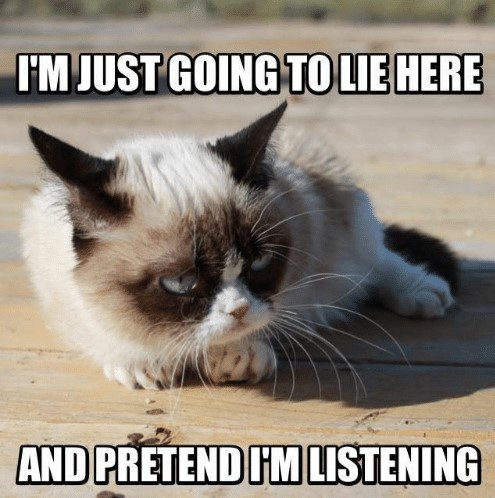Read Time: ~17 mins
Ok. So. We’ve all heard it before—public speaking is the most common fear in North America. We start to sweat, blood pressure rises, our mouth dries, heart rate elevates and we feel weak. We, according to these polls, would rather be blindsided by a spider than a microphone. So let’s briefly talk about ‘why,’ and then move on to ‘how we can fix it.’
Now as a quick disclaimer, if you have a diagnosed anxiety disorder, I’m by no means a doctor, just a professional speaker with a lot of first hand experience and supporting research into my field. So although you can absolutely read and use my tips, there are likely some barriers that cannot be overcome without professional medical help.
The Quick Set-Up: What Is a “Fear” of Public Speaking?
Put simply, fear originated as a simple fight or flight stimulus — protecting us from danger. Great right? But a human’s ability to learn and incorporate context into understanding that fear has opened up the doors for lots of fear inducing situations.
Generally, we’re not afraid of speaking, we’re afraid of what happens if we flop. What will the reaction be? What will people say? Think about it: we speak every day — to our families, our friends. If you’re looking for the psychology behind it, I’d recommend this link. But here, let’s get to the actions. What can we do to overcome this fear?
Stage 1: Pre-Pre Speech
👉 Write / Prepare Speech in YOUR Voice
This is vital and often overlooked.
Close your eyes. Don’t actually, but daydream with me. Think back to 2nd grade. You’re eating a fruit roll up, saying fake words Dr. Seuss made you believe were real, and playing with scissors even though your teacher told you not to. While you’re basking in the happiness of being 7 years old, you glance over and read Ms. Johnson’s big poster above the door.
It reads… “BE YOURSELF.”
Surprise! Turns out Ms. Johnson was preparing you for public speaking 101.
When preparing for your speech, prepare for YOUR speech. Not Barack Obama. Not Steve Jobs circa 2005. Not even your colleague who gave that cool presentation on “why llamas are the 3rd best animal in South America.” Yours.

Authenticity is not only important from an audience standpoint (in building credibility), but also from a personal comfortability angle too. You’re the best at being you, so write that speech, prepare that speech, practice that speech, and deliver that speech as you.
👉 Practice… Like A Lot.
Practice isn’t only for sports or piano, it’s the basis of any skillset. And we know that. But often when it comes to public speaking, we (maybe purposefully) forget it.
From a macro level we also know we tend to feel more confident the better we are at something. Think of a skill you’re above average at. Maybe cooking, basketball, or memorizing complicated handshakes. And ask yourself, when presented with the opportunity to showcase that skill, are you usually pretty quick to do so?
From a micro level, and specifically related to public speaking, feeling like you’re prepared for the speech you’re about to deliver can help ease the anxiety.
Here are 2 quick tips for practicing:
1. When Memorizing / Practicing, Say Your Speech Out Loud.
You 👏 Need 👏 To 👏 Practice 👏 Out 👏 Loud 🗣️
You’re not reading your speech, you’re speaking it. So practice speaking it. We don’t practice shooting by dribbling. Sure, it helps you get there, but it isn’t the final product.
Bonus pro-tip for the writing process. As you write, continuously read it out loud to make sure it sounds right for the ear.
2. Practice it in Front of Live… Things.
If you have people who don’t mind you saying words in front of them, I’d recommend that. Family. Friends. Someone you trust. Just ask them to listen. Up to you if you want feedback or not (make that clear beforehand), but at a minimum, allowing yourself to be vulnerable in front of people, and deliver the words you’re about to deliver in front of more people, will help you.
If you don’t have people, a cat or a dog works too. Not as responsive. But still gives you something to focus on.

Also please pet your dog or cat for me. Thanks.
👉 Set Expectations for Yourself. Yeah. For Real.
Remember learning about the “self fulfilling prophecy” in school? Because it’s a pretty big mental tool we unfortunately tend to use for bad more than good.
To refresh your memory, a self fulfilling prophecy is when we hold a belief or expectation, which through our subconscious behaviour, actually manifests into happening. It’s a really cool concept… if we use it in a positive light.
Let’s flip Courtney Ackerman’s, at PositivePsychology.com, example from a ‘bad day’ to a ‘bad speech’: if you continue to believe you’re going to completely bomb your speech, “your attitude might make your prediction come true.” She goes on to say, “You may unconsciously work to affirm your belief by ignoring the positive, amplifying the negative, and behaving in ways that are unlikely to contribute to a [successful speech]”.
And look, I know it’s scary to say “I’m gonna do well”. We’re often looking for an escape hatch. We’d rather aim low and hit just above that, rather than aim high and miss. Failure’s a scary thing, but so is never taking the chance.
Point is. Set expectations. Use the self-fulfilling prophecy to your advantage, don’t let it take advantage of you.
Stage 2: Pre Speech (The day of speech)
👉 The Physical: Breathe, Eat & Drink
Not booze. Don’t drink booze. I know you may WANT to but don’t be a Drunk Dave or Darlene. Drink water. Our body loves water. So does our brain. And we want our brain to love us when we’re delivering our speech.
Anyway… The keys:
- Hydrate. Liven up that dry mouth with regular small sips of water. Don’t be afraid to bring your water up with you too – in fact, I encourage it.
- Eat. Yup. Fuel that body. Give your body all the nutrients it needs to help offset that weak feeling that comes with the nerves. Foods rich in… food… are perfect choices. Just eat.
- Breathe. This one’s actually a bit tricky. Because surprisingly enough, you do actually want an elevated heart rate (to a degree). We’ll chat a bit more about that in “The Emotion” section below. But to feel composed and collected, deep diaphragmatic breathing is a must leading up to the big speech.
Eat, Drink & Be Breathing. Not sure that’s how the saying goes exactly, but it works, right?
👉 The Mental: Visualize
Here’s a quick exercise you can do the day-of — visualize yourself giving the speech in the exact place it’ll be delivered.
Once you know what the stage, the boardroom, the conference area, whatever the venue is, once you’ve seen it, begin to imagine yourself in the moment, delivering your message.
It’s essentially a dress rehearsal done entirely in your head. Just like practicing, this technique can help de-stress you by feeling as prepared as possible for the big moment.
👉 The Emotional: Reappraisal – Shifting Anxiety into Excitement
This is one of my biggest pieces of advice that’s helped me over the years. It’s the process of shifting anxious feelings into excitement. And it’s done through a process called ‘reappraisal’.
Here’s the background to understand:
Appraisal
is simply the original interpretation of emotion we assign to an event. For example, your boss pops into your office one day and says “hey, I’d like you to speak on behalf of the company in front of a couple hundred at our conference next week.” You say “yes,” then immediately it hits you, and you appraise the event as anxiety inducing.
Reappraisal
is then the process of taking that original emotional state and deciding the event actually means something else to you. So in continuing with our example, you can choose to change the way you see this speaking task. Let’s look at a couple options:
- You could decide that you’re indifferent about the event. If you don’t care how it goes, and maybe you’re looking for a reason to get fired (yikes), you can get rid of the anxious feeling but deciding that it means nothing to you
- You could decide this whole thing is a massive opportunity. A chance to stand out and impress. An opportunity you’re grateful and excited for. And suddenly your whole emotional outlook begins to change.
That’s the basis of reappraisal. Now for the real application (and why I love / use it so much)
In a study by Alison Wood Brooks at Harvard, she conducted an experiment where she tested the performance of 140 participants who were given two minutes to prepare a persuasive speech about ‘why they are a good work partner.’
The only difference between the two groups was a phrase they were told to say before delivering the speech.
One group was told to say out loud, “I feel excited,” the other, “I feel calm.”
And at the end, the group who proclaimed they were ‘excited’, were rated by a panel of unknowing judges as more persuasive, confident, competent, & persistent, and also spoke for a longer period of time.
All participants were anxious, but simply reappraising that anxiety as excitement can make a HUGE difference. The study also drew the connection that both anxiety and excitement elicit many of the same physiological responses, so reappraisal in this setting doesn’t even need to change the physical effects, rather it just uses them in a positive way.
If there’s one technique you want to implement from this article, from both personal experience, and scientific backing, this is the one to go with.
Stage 3: During Speech
👉 Remember the Audience (Usually) Wants You to Succeed
99.9% of the time, unless you spilled coffee on them, took their coffee from them, or stole their money they were going to buy coffee with, your audience wants you to do well.
Put yourself in the audience’s shoes. Not literally of course. But if you’re sitting there, listening to a speaker speak, would you rather be entertained, enlightened, & educated… or actively bored and disinterested?
Our audiences want to be engaged, it’s simply up to us to engage them.
Now, I know what you’re thinking. ‘Chris! Are you sure? I spoke once and everyone looked so disinterested.’
Here’s what I’ll say to that; don’t be so quick to assume. Audiences and crowds are really susceptible to the bystander effect. Essentially, the gist of this cognitive effect is that if you get hurt in the park, you’re more likely to receive help if there’s only one person around, compared to hundreds. Or in other words, the more people there are, the more we pass responsibility, thinking someone else will do it.
In speaking terms, let’s say we have a 1-on-1 conversation with someone. They’ll give us cues to let us know their listening and understanding (head nods, mhms, etc). When we’re speaking to a group, that bystanding effect kicks in and most people stop giving those reassurance markers, thinking they don’t need to.
So to bring that together: just because people don’t look like they’re listening doesn’t mean they aren’t.
Believing your audience is rooting for you is a big step in alleviating the stress of delivering that speech.
Always, ALWAYS remember: your audience wants you to do well.

👉 The 17 Muscle Cheat Code: Smile
So simple, yet so overlooked. The power of a smile.
A smile can do two things:
-
Trick you into feeling happy
- Smiling produces a chemical reaction that actually makes you feel happier. So during the speech, smilies can actually trick our bodies into feeling better with the release of dopamine (happiness) and serotonin (reduced stress). Just remember to brush the teeth.
-
Spread to your audience.
- Smiles are contagious. Like a yawn, but with less noise. Studies have even shown when we mimic others’ facial expressions, we can more easily empathize with that person too. And from an anxiety relief point of view, seeing people smile at you can be very comforting. But remember what we talked about in the previous section, if they don’t smile back it doesn’t mean they’re not with you.
- Smiles are contagious. Like a yawn, but with less noise. Studies have even shown when we mimic others’ facial expressions, we can more easily empathize with that person too. And from an anxiety relief point of view, seeing people smile at you can be very comforting. But remember what we talked about in the previous section, if they don’t smile back it doesn’t mean they’re not with you.
👉 Be Present
Public speaking can feel terrifying, even for the pros, but it’s also invigorating and when we learn to conquer the crippling fear, it’s one of the (I think) best ways to feel alive.
So when you’re speaking, soak in the moment. Use the increased levels of adrenaline and cortisol to thrive in opportunity.
Oration goes back tens of thousands of years. When you’re speaking you’re a part of one of the oldest human traditions on Earth. Not to mention, you have the ability to inspire, to change, to educate, to enlighten, to entertain, to shape the way another human thinks and acts. All because you said yes, stepped on stage and put aside your fear.
Congratulations.
The Take-Aways
Conquer your fear of public speaking in stages.
Break it down into the pre-pre, the pre and the during. Implement any of the techniques above you think will help you & let me know how it went!
Remember: I want you to succeed. Your audience wants you to succeed. You just need to decide if you want yourself to succeed.




